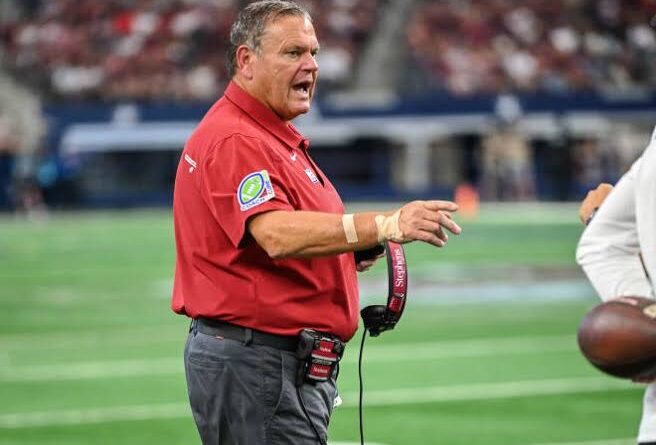Imminent report: Sam Pittman share new light why he believes he is still the best candidate for the Razorback
Sam Pittman: The Right Man for the Job
It was a crisp fall morning in Fayetteville, and the fog still lingered over the practice fields at the University of Arkansas. Inside the Broyles Athletic Complex, a sense of tension could be felt among the Razorback faithful. The season had not gone as planned, and the calls for change had grown louder. Fans, analysts, and boosters wondered if Sam Pittman, the folksy, straight-talking head coach, was still the right man to lead the Hogs.
On this particular morning, Pittman had called an unscheduled press conference. The media room buzzed with anticipation as reporters speculated on the purpose. Was he announcing his resignation? A change in staff? Or something else entirely?
Pittman entered the room with his characteristic smile, though it seemed a bit wearier than usual. He sat down at the table, adjusted the microphone, and took a deep breath before speaking.
“First off,” Pittman began, looking directly at the gathered reporters, “I know y’all have a lot of questions, and I want to address the elephant in the room. I’ve heard the noise. I’ve seen the criticism. I get it. We haven’t had the success we all want. And I take responsibility for that. But I want to tell you why I believe I’m still the best man for this job.”
The room fell silent. Even the most seasoned reporters leaned in, sensing this wasn’t going to be a routine press conference.
“I didn’t come to Arkansas because it was an easy gig,” Pittman continued. “I came here because I love this place. Because I know what it means to be a Razorback. I know what this program can be, and I know how far we’ve come, even if it’s not always reflected in the win column.”
Pittman paused, his eyes scanning the room, searching for a connection with the people he was speaking to.
“When I took over, we were in a tough spot. We were at rock bottom. And I’m not saying that to pat myself on the back. I’m saying it because it’s the truth. I didn’t just take a job here; I took on a mission. A mission to rebuild not just a football program, but a culture. And I think that’s something we’ve done. Our players fight for each other. They fight for this state. We’ve brought in kids who believe in the Razorback way, and we’ve sent men out into the world who embody what it means to be a Hog.”
He leaned back in his chair, letting the gravity of his words sink in.
“Look, I know winning is what matters. I know we’re in the SEC, and there’s no sympathy for coming close. But building a program takes time. It’s about more than just getting the right recruits or calling the right plays. It’s about building a foundation that lasts. And I believe we’ve done that. The wins will come.”
Pittman’s voice softened, taking on a more personal tone.
“I’ve coached at a lot of places, and I can tell you this: the connection I have with this fanbase, with this state, is different. I’m one of y’all. I came from small-town beginnings, just like a lot of the people who fill up Razorback Stadium every Saturday. I’m not a flashy guy, and I’m not gonna promise you the moon. But I can promise you this: nobody wants to win here more than I do. Nobody cares more about these kids and this program than I do.”
He leaned forward again, hands clasped on the table, a steely resolve in his eyes.
“I know there are people out there who think we need a change. And if that’s what the administration decides, I’ll walk out of here with my head held high, knowing we gave it everything we had. But if you ask me why I’m the best man for this job, it’s because I’m not just coaching a football team. I’m part of a family. I’m part of a community that’s bigger than any one season or any one game.”
Pittman stood up, signaling the end of the conference.
“So, if you’re asking if I still believe I’m the right man for the job? The answer is yes. Because I believe in these kids. I believe in this staff. And I believe in Arkansas. And as long as I’m here, I’ll fight like hell for this program. That’s a promise.”
With that, Sam Pittman walked out of the room, leaving the reporters to ponder his words. It wasn’t a resignation speech. It wasn’t a plea for mercy. It was a declaration of his commitment—a reminder of why he was chosen in the first place and why, despite the challenges, he still believed he was the best man for the job.
As the door closed behind him, there was a moment of silence, then a murmur of voices. Whether Pittman had convinced everyone in that room was uncertain. But for those who understood what he had inherited, the uphill battle he faced, and the heart he brought to the task every day, his message was clear: Sam Pittman wasn’t ready to give up, and he wasn’t done fi
ghting for the Razorbacks. Not yet.
